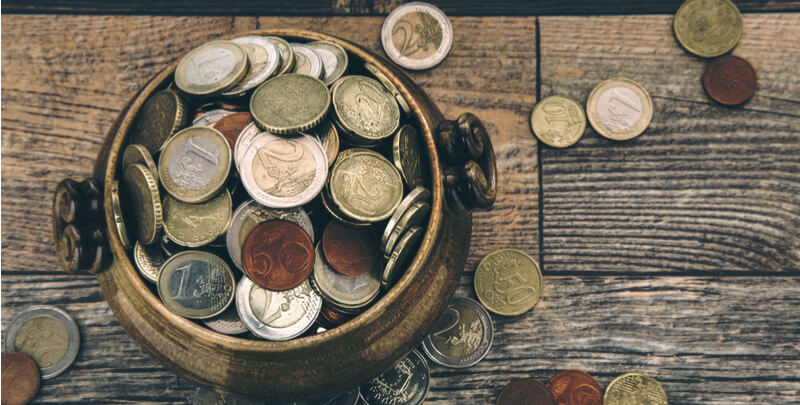Ski resorts in Austria (UK guide)
Discover the best ski resorts in Austria for every budget, from luxury escapes to self-catered stays plus travel, packing and money-saving tips.

Known as the land of beautiful Alpine mountains and decadent desserts, Austria has a fascinating history. When Turks fled Vienna in the 17th century, they left a large quantity of coffee beans in their wake, starting the now-famous coffee house tradition. Current-day Austria is the the German-speaking part of the Austro-Hungarian empire, which was ruled by the mighty Habsburg family from 1526 to 1918.
Through this guide, you’ll get a break down Austria’s currency, where to find money, how to spend it, and an overview of the banks there.
As part of the eurozone, the official currency in Austria is the euro and has been since 1999. The country also produced a series of coins to proudly showcase the country. Among them are Alpine flowers on 1,2 and 5 cent coins, and Vienna’s impressive St. Stephan’s Cathedral on 50 cent coins.
| Names and nicknames | Euro |
|---|---|
| Symbols and abbreviations | Written as € or EUR is the international 3-letter code on the currency exchange market |
| 1 EUR | One euro is subdivided into 100 cents, similar to the dollar. |
| EUR coins | Euro coins are available in denominations ranging from 1 cent to 2 euros. In Austria, it’s common to pay for smaller purchases with one and two euro coins. |
| EUR banknotes | Euro bills range from €5 to €500. They are printed on pure cotton fiber, improving their durability and giving them a distinctive feel. |
If you were hoping to slip by using money from back home, you likely won’t be able to get away with that in Austria. It’s fairly uncommon to pay for goods there in any currency besides the euro. However, international credit and debit cards are still widely accepted at major retailers. ATMs are also widely accessible, and foreign debit cards can often be used to withdraw cash. There’s also the possibility of exchanging cash at several locations. But more on that later.
Foreign visitors to Austria can exchange their currency both at banks and exchange venues.
You should be able to find a few spots to exchange your cash from home without too much gouging going on. Here are a few places to start your search:
Often, exchange places, especially at airports and hotels, will try to entice customers by advertising their favorite phrases: “0 fees” or “No commission”. However, this is nearly always false advertising. If you do a quick search on Google or with an online currency converter, you’ll find that your money is worth far more than an exchange bureau or bank is promising you. Banks and large global finance markets trade money all day, and the real rate, the one you find on Google, is often referred to as the mid-market rate. It’s the benchmark of what your money is actually worth, although banks and transfer exchange services will often make up their own, much poorer exchange rate for you and then pocket the difference. So even if it seems like a good deal, make sure to shop around and check rates on Google before you commit to the exchange.
Airports and hotels take advantage of being captive markets -- meaning they can change higher prices due to the lack of alternative suppliers around. Exchange only what you will need at these locations before reaching an exchange center with a more reasonable rate. Your pocketbook won’t regret it.
If you’ve brought along cash with you from back home, make sure that those bills in your pocket are in good shape. In Austria, merchants will sometimes refuse to accept any sort of damaged banknotes to exchange. Ensure that your euro banknotes are not damaged or torn to be sure that they are accepted.
Through the new Wise Borderless multi-currency account, you can hold your money in dozens of different currencies and transfer to an Austrian bank account whenever you need it. Not only that, but your money will be converted from one currency to another at the same rate as you find on Google - saving you tons of cash in the long run.
If your trip to Austria is still a bit far away, starting in early 2018, there will be consumer debit cards produced specifically for Borderless accounts which can be used internationally.
You can buy traveller’s cheques (or ‘checks’ in the US) at most banks, which will charge a rate of anywhere from 1-3% of the purchase amount. Despite the higher cost, if you still want to purchase traveller’s cheques, it’s better to buy euro-specific cheques. That will make them more likely to be accepted at local businesses, and without having to deal with the hassle of paying high conversion fees. Nowadays, however, it’s better to simply use cash or a debit credit card if you can, which are far more likely to be accepted in Austria.
Major providers such as American Express, Visa, Mastercard and Diners Club are widely accepted at major restaurants, stores and hotels in Austria. However, Austrian stores are famous for only accepting cash at smaller shops and grocery stores. So it’s a wise idea to always carry cash with you while you’re there.
The good news is that ATMs in Austria rarely charge on-site withdrawal fees like you find in many other countries.
The not so great news is that when you make purchases with your card, or withdraw money from an ATM, you may run into a service called Dynamic Currency Conversion (DCC).If this happens, the card merchant or ATM will offer for you to be charged in your home currency rather than in euros. At first glance, it seems rather convenient and much more comfortable to do the transaction in a currency you’re much more familiar with. However tempting as it may seem, you’ll need to keep in mind that you’ll be marked up in price, sometimes at four or more percent, for the convenience of merely seeing the numbers in your home currency. With DCC, you essentially sign over the right of the local ATM to give you whatever exchange rate they feel like for the day - which is almost never in your favor. You’re better off doing transactions in the local currency, euro, where your home bank will give you a much better exchange rate, and save you a lot in the long run.
One thing many travellers forget before heading out on their overseas adventures is to give their bank a heads up that they’ll be abroad. Don’t let that be you. Before you land in Austria, don’t forget to tell your bank or card issuer that you’re going abroad. Otherwise they could think there’s suspicious activity taking place and lock your card.
ATMS are very common in Austria, particularly in retail centers of larger cities such as Vienna and Salzburg. As long as you have a 4-digit pin number for your ATM card, you can typically withdraw from foreign bank accounts.
Yet, you’ll still want to make sure to watch out for offers to be charged in your home currency rather than the local one. If you see the option, always select to be changed in euros to avoid steeper fees added into poor exchange rates..
If you’re on the lookout for an ATM near you, VISA runs a global ATM locator website which can be used to find ATMs throughout Austria.
There are over numerous banks operating in Austria, many with international branches. So if you aren’t sure if your home bank has a branch, it’s worth investigating if they may have a partner in Austria, which could help reduce overall ATM fees if you find there’s one.
In short, finding - and spending - money in Austria is a fairly seamless process, as long as you know where to look.
*Please see terms of use and product availability for your region or visit Wise fees and pricing for the most up to date pricing and fee information.
This publication is provided for general information purposes and does not constitute legal, tax or other professional advice from Wise Payments Limited or its subsidiaries and its affiliates, and it is not intended as a substitute for obtaining advice from a financial advisor or any other professional.
We make no representations, warranties or guarantees, whether expressed or implied, that the content in the publication is accurate, complete or up to date.

Discover the best ski resorts in Austria for every budget, from luxury escapes to self-catered stays plus travel, packing and money-saving tips.

This article gets you one step closer to your affordable vacation in Austria by detailing your options for VAT refund in Austria as a tourist.

Though settled in 500 BC, Vienna feels anything but ancient. It has become known for its start-up culture and is repeatedly cited as one of the best cities in...